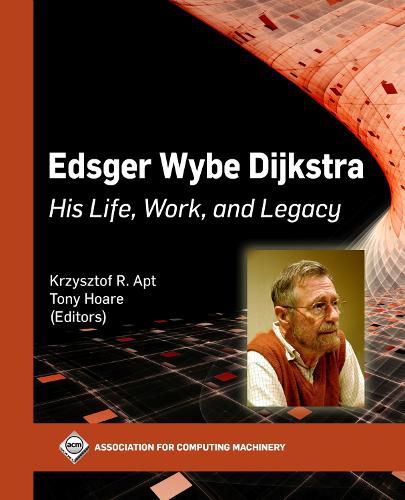Readings Newsletter
Become a Readings Member to make your shopping experience even easier.
Sign in or sign up for free!
You’re not far away from qualifying for FREE standard shipping within Australia
You’ve qualified for FREE standard shipping within Australia
The cart is loading…






This title is printed to order. This book may have been self-published. If so, we cannot guarantee the quality of the content. In the main most books will have gone through the editing process however some may not. We therefore suggest that you be aware of this before ordering this book. If in doubt check either the author or publisher’s details as we are unable to accept any returns unless they are faulty. Please contact us if you have any questions.
Edsger Wybe Dijkstra (1930-2002) was one of the most influential researchers in the history of computer science, making fundamental contributions to both the theory and practice of computing. Early in his career, he proposed the single-source shortest path algorithm, now commonly referred to as Dijkstra’s algorithm. He wrote (with Jaap Zonneveld) the first ALGOL 60 compiler, and designed and implemented with his colleagues the influential THE operating system. Dijkstra invented the field of concurrent algorithms, with concepts such as mutual exclusion, deadlock detection, and synchronization. A prolific writer and forceful proponent of the concept of structured programming, he convincingly argued against the use of the Go To statement. In 1972 he was awarded the ACM Turing Award for fundamental contributions to programming as a high, intellectual challenge; for eloquent insistence and practical demonstration that programs should be composed correctly, not just debugged into correctness; for illuminating perception of problems at the foundations of program design.
Subsequently he invented the concept of self-stabilization relevant to fault-tolerant computing. He also devised an elegant language for nondeterministic programming and its weakest precondition semantics, featured in his influential 1976 book A Discipline of Programming in which he advocated the development of programs in concert with their correctness proofs. In the later stages of his life, he devoted much attention to the development and presentation of mathematical proofs, providing further support to his long-held view that the programming process should be viewed as a mathematical activity.
In this unique new book, 31 computer scientists, including five recipients of the Turing Award, present and discuss Dijkstra’s numerous contributions to computing science and assess their impact. Several authors knew Dijkstra as a friend, teacher, lecturer, or colleague. Their biographical essays and tributes provide a fascinating multi-author picture of Dijkstra, from the early days of his career up to the end of his life.
$9.00 standard shipping within Australia
FREE standard shipping within Australia for orders over $100.00
Express & International shipping calculated at checkout
This title is printed to order. This book may have been self-published. If so, we cannot guarantee the quality of the content. In the main most books will have gone through the editing process however some may not. We therefore suggest that you be aware of this before ordering this book. If in doubt check either the author or publisher’s details as we are unable to accept any returns unless they are faulty. Please contact us if you have any questions.
Edsger Wybe Dijkstra (1930-2002) was one of the most influential researchers in the history of computer science, making fundamental contributions to both the theory and practice of computing. Early in his career, he proposed the single-source shortest path algorithm, now commonly referred to as Dijkstra’s algorithm. He wrote (with Jaap Zonneveld) the first ALGOL 60 compiler, and designed and implemented with his colleagues the influential THE operating system. Dijkstra invented the field of concurrent algorithms, with concepts such as mutual exclusion, deadlock detection, and synchronization. A prolific writer and forceful proponent of the concept of structured programming, he convincingly argued against the use of the Go To statement. In 1972 he was awarded the ACM Turing Award for fundamental contributions to programming as a high, intellectual challenge; for eloquent insistence and practical demonstration that programs should be composed correctly, not just debugged into correctness; for illuminating perception of problems at the foundations of program design.
Subsequently he invented the concept of self-stabilization relevant to fault-tolerant computing. He also devised an elegant language for nondeterministic programming and its weakest precondition semantics, featured in his influential 1976 book A Discipline of Programming in which he advocated the development of programs in concert with their correctness proofs. In the later stages of his life, he devoted much attention to the development and presentation of mathematical proofs, providing further support to his long-held view that the programming process should be viewed as a mathematical activity.
In this unique new book, 31 computer scientists, including five recipients of the Turing Award, present and discuss Dijkstra’s numerous contributions to computing science and assess their impact. Several authors knew Dijkstra as a friend, teacher, lecturer, or colleague. Their biographical essays and tributes provide a fascinating multi-author picture of Dijkstra, from the early days of his career up to the end of his life.